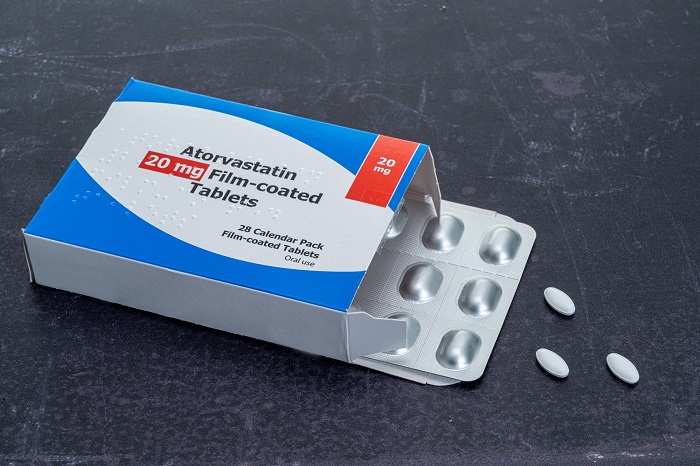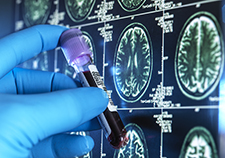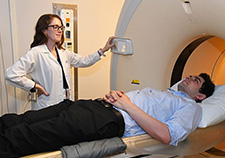Office of Research & Development |
 |
Office of Research & Development |
 |


A research team including scientists from the Cleveland VA identified an approach for preventing nerve cell degeneration in the brain by exploring the connection between TBI and Alzheimer’s disease. (Illustration: ©iStock/Getty Images Plus/peterschreiber.media)
October 21, 2021
By Tamar Nordenberg
For VA Research Communications
"We are keenly interested in identifying the mechanistic link between TBI and Alzheimer's disease."
Researchers have discovered an approach that could prevent nerve cells in the brain from deteriorating after a traumatic brain injury (TBI).
A research team including scientists with the Geriatric Research Education and Clinical Center at the Louis Stokes Cleveland VA Medical Center identified the approach for preventing nerve cell degeneration by exploring the connection between TBI and Alzheimer’s disease.
Their research, summarized earlier this year in the journal Cell, linked the two diseases by identifying a harmful process—acetylation of the tau protein—occurring in the brain in both conditions.

Dr. Andrew A. Pieper (standing, center, with blue suit), the senior author of the study, is a psychiatrist at the Cleveland VA. Here, he’s with his lab team at the Harrington Discovery Institute in Cleveland. (Photo courtesy of Pieper lab)
Importantly, the investigators went on to identify two FDA-approved medications that could obstruct the dangerous process. They say these drugs could suggest new directions in TBI and Alzheimer’s research and treatment.
“By following through on this line of research, we hope to one day be able to tell Veterans and others who have suffered a TBI, ‘We have medicines to help your brain repair itself and recover from your injury,’” says Dr. Andrew A. Pieper.
Pieper is a VA psychiatrist and researcher, and senior author on the Cell article, titled “Reducing Acetylated Tau is Neuroprotective in Brain Injury.”

Could cholesterol medicine reduce dementia risk in seniors?

VA study reveals dementia risks unique to people with African ancestry

Head trauma, PTSD may increase genetic variant's impact on Alzheimer's risk

VA-led research finds PET scans important for ruling out Alzheimer's disease
Traumatic brain injuries are caused by a bump, blow, or jolt to the head. These types of injuries are common, with about 5 million people in the United States living with a disability after TBI. Brain injuries frequently occur during activities and events like rough contact during sports, car accidents, and falls. In service members and Veterans, TBI also often follows from explosions during combat or training exercises. TBI can lead to headaches, irritability, sleep disorders, memory problems, slowed thinking, and depression. These problems can turn into long-term challenges with brain function that disrupt people’s lives.
Along with factors such as aging and genetics, TBI has been found to raise the risk of Alzheimer’s disease. The reason for this association between brain injury and Alzheimer’s disease has been unknown.
With funding from VA and other sources, the scientists in Andrew Pieper’s lab at the University Hospitals’ Harrington Discovery Institute in Cleveland set their sights on solving the riddle.
“We are keenly interested in identifying the mechanistic link between TBI and Alzheimer’s disease,” Pieper says. He explains that an understanding of this fundamental issue holds great potential for helping so many people with either condition.
“In terms of Alzheimer’s disease, “we can’t do anything about our genetics or stop our aging. Preventing whatever increases the risk of Alzheimer’s disease after TBI thus represents a great opportunity to meaningfully protect people from brain neuron deterioration.”
The research project began when Dr. Min-Kyoo Shin, a senior research scientist in Pieper’s lab, decided to examine whether acetylated tau (ac-tau) was an offender in TBI. Previous studies had identified the destructive substance in brains of people with Alzheimer’s disease.
Shin’s study found a rapid elevation of the suspected substance in mice after TBI. It also showed that this modification of the tau protein was causing parts of the brain’s nerve cells called axons to degenerate. This harmed cognitive function.
“Although TBI is one of the strongest risk factors in dementia and Alzheimer’s disease, before our finding, nobody had shown how TBI may lead to this condition,” points out Shin, a first author on the Cell paper.
The team’s research also showed that the level of ac-tau in the brain was reflected in the amount of the substance in the blood. This means that measuring the blood level offers promise as a biomarker for TBI, to assist in monitoring the severity and progression of nerve cell deterioration after brain injury.
The scientists went on to explore whether it was possible to inhibit the acetylation of tau after injury, and if so, whether this would block the nerve cells from degenerating and protect the animals from neurologic impairment.
No medicines have been approved for the specific purpose of stopping nerve cell death after brain injury. The researchers studied various drugs approved for other conditions, as well as experimental drugs, and found that two existing medicines—salsalate and diflunisal—were especially protective after TBI in mice.
“Both of these medicines quickly inhibited acetylation of the tau protein and completely blocked nerve cell degeneration, protecting the mice from TBI-related brain decline,” says Dr. Edwin Vázquez-Rosa, Cell article co-first author and also a senior research scientist in the Pieper laboratory.
The two medications are already on the market for other conditions. Vázquez-Rosa says salsalate and diflunisal are non-steroidal anti-inflammatory drugs like aspirin, ibuprofen, and naproxen. But these other NSAIDs don’t inhibit tau acetylation like salsalate and diflunisal do.
Following up on their findings in mice, the investigators used a sophisticated algorithm, in collaboration with Dr. Feixiong Cheng of the Cleveland Clinic Foundation, to comb through millions of (non-VA) patient records. They found that the two NSAIDs, salsalate and diflunisal, were associated with a significantly lower occurrence of Alzheimer’s disease, as well as clinically diagnosed TBI, in those who had taken them, compared with those who had taken aspirin.
“In aggregate, the animal and human data presented here offer compelling support for a neuroprotective effect of reducing ac-tau,” the authors write in Cell, “which supports further exploration of the potential protective efficacy of diflunisal or salsalate in patients with TBI or AD.”
Pieper and his team plan additional research to extend their findings. For example, the group hopes to pursue studies in patients to further evaluate the changes in blood ac-tau levels after TBI and with recovery, and also whether certain drugs can decrease these levels.
“Many of the patients in our VA clinic have suffered from the effects of TBI. This is an important problem for Veterans, and has drawn many others in the VA to study this area, as well,” Pieper says. “If we see results in human testing that confirm the role of ac-tau in human TBI, and the potential of medications for rolling back this acetylation, it could have tremendous implications for therapy for a multitude of patients in our system.”
VA Research Currents archives || Sign up for VA Research updates